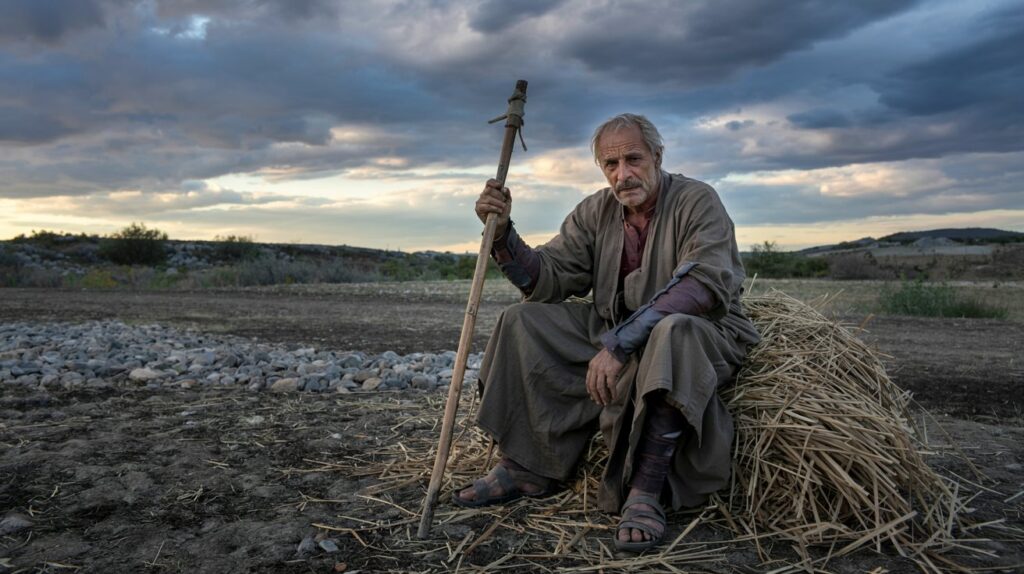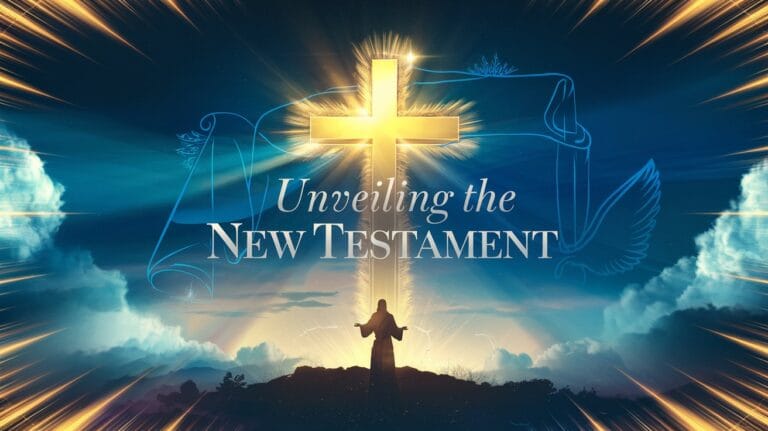Your cart is currently empty!
Redeemer Lives: Job’s Powerful Faith
Imagine having everything taken away from you. Your kids, your health, your money – all gone. That’s what happened to a guy named Job in the Bible. He was a good person, but terrible things kept happening to him. His friends tried to tell him it was his fault, that he must have done something wrong to deserve such pain. But Job knew he hadn’t done anything that bad.
In the middle of all this sadness and confusion, Job said something really important: “For I know that my Redeemer lives!” (Job 19:25). This sentence has been talked about and thought about for thousands of years. Let’s break down what it meant for Job and what it means for us today.
I. Job’s Tough Situation in Chapter 19

To understand why Job’s words are so powerful, we need to know what was going on around him. The “Enduring Word Bible Commentary” helps us see the picture:
- His Friends Were Not Helpful: Job was already hurting, but his friends made it worse with their mean words. They kept telling him he was a sinner and that’s why he was suffering. It’s like when someone is already down, and instead of helping them up, you keep pushing them. A famous preacher named Spurgeon said that words can hurt more than a knife. Another person, D.L. Moody, pointed out that sometimes people in church focus too much on being right about their beliefs and not enough on being loving. Job felt this from his friends.
- He Said He Was Innocent: Job didn’t think he deserved all the bad things happening to him. He said, “If it is true that I have gone astray, my error affects only me” (Job 19:4, NIV). He knew he wasn’t perfect, but he didn’t think he had done anything to cause such huge problems.
- He Felt Like God Was Against Him: Job felt like God had turned on him. He said God had “closed in my path so I cannot pass” (Job 19:8, NIV). Everything was going wrong. His family and friends didn’t want to be around him anymore (“My relatives have gone far away, and my friends have forgotten me,” Job 19:13, NIV). Even his wife didn’t like his breath, and his own kids made fun of him (“My breath is offensive to my wife; I am loathsome to my own family,” Job 19:17, NIV). He was so sick and thin that he felt like he was barely alive (“My bones cling to my skin and to my flesh; I have escaped by the skin of my teeth,” Job 19:20, NIV). Spurgeon explained that “escaped by the skin of my teeth” meant he had almost nothing left.
- He Begged for Kindness: Because he was suffering so much, Job asked his friends to be kind to him. He said, “Have pity on me, my friends, have pity, for the hand of God has struck me!” (Job 19:21, NIV). He felt like God was attacking him, and his friends were doing the same thing.
- But Then He Said Something Amazing: Even though everything was terrible, Job made a strong statement of belief: “For I know that my Redeemer lives!” He even wanted his words to be written down forever.
II. What Did “My Redeemer Lives” Mean?

The Bible experts have different ideas about what Job meant by this powerful sentence:
- God as His Helper and Defender: The word “Redeemer” comes from a Hebrew word, goel. This word meant someone in the family who would help you if you were in trouble. They would defend you if someone hurt you, get revenge for you if you were killed unfairly, and help you get back things you had lost. One person, Lawson, said a goel was like a superhero for people who were treated badly. Smick explained that in the old days, if someone was killed, their goel would make sure the killer was punished. They would also help someone get back their land if they had to sell it because they were poor. Job saw God as this kind of helper – his judge, his witness, and now, his goel. Another expert, Ellicott, said that Job had been wanting someone to stand up for him, and now he believed God would be that person.
- Hope for the Future: Job was sure that even if he kept suffering now, his Helper would eventually prove he was innocent. Meyer thought Job believed there was someone in heaven who would come to Earth one day and show everyone that Job was right. Spurgeon said that maybe Job didn’t even fully understand what his words meant, but he held onto the belief that God would make things right in the end.
- Maybe It Was About Jesus: Some people who study the Bible, like Benson and Matthew Henry, think that when Job said “Redeemer,” he was actually talking about Jesus Christ. Benson said that Jesus is like our family member who saves us from the bad things we’ve done and will get back everything we’ve lost because of sin and death. The phrase “at the latter day” (Job 19:25) is also seen by some as talking about the time when the Messiah (Jesus) would come or when people would be raised from the dead. Matthew Henry said Job believed in a living Helper who would come as the Judge, bring people back to life, and finish saving them.
- Help Now or Life After Death?: Some people think Job was hoping God would save him from his current problems. But because Job felt like he had no hope of things getting better in his lifetime, many believe he was looking forward to a better life after death. He hoped he would be happy then.
- Not Everyone Agrees on All the Details: A website called “GotQuestions.org” says we need to be careful about reading too much into Job’s words. They agree that Job probably saw God as his Helper who would show his friends were wrong. But they don’t think Job fully understood everything Christians believe about Jesus coming to Earth, dying, coming back to life, and giving us eternal life. They also point out that the phrase “at the last he will stand upon the earth” could also mean “upon the dust” or “on my grave,” suggesting Job might have thought he would be proven right either in this life or after he died. And the words “in my flesh shall I see God” could even mean “without my flesh,” like seeing God after he died.
III. Why This Verse is So Important and How It’s Used

Job’s statement is a big deal for a few reasons:
- It Shows Hope in Tough Times: Even when everything looked hopeless and his friends were making him feel worse, Job didn’t give up on God. He believed that God would eventually help him. This gives us hope when we go through hard times.
- It Points to Jesus: For Christians, Job’s words are like a hint about Jesus, who they believe is the ultimate Helper who came to save us from sin and death and will come back again.
- It Inspired a Famous Song: There’s a well-known Christian song called “I Know That My Redeemer Lives.” The Wikipedia page about this song says it’s a popular song, especially around Easter when Christians celebrate Jesus coming back to life. It says the song is based on Job’s words but is mostly about Jesus’ resurrection. It was even included in a songbook for the early members of the Church of Jesus Christ of Latter-day Saints. The song is often sung to a tune called “Duke Street.”
IV. What Do People Today Think About This?

If you look at online discussions, like on Reddit, you see that people today still think a lot about Job’s story and his famous words. They often ask tough questions:
- Why Do Bad Things Happen to Good People?: The main question people have is why someone like Job, who was said to be a good man, had to suffer so much. One person on Reddit said they lost their faith because it seemed unfair what happened to Job.
- What’s Up With Satan?: People also wonder about Satan talking to God and God letting Satan hurt Job. Some think Satan still had access to God back then, but eventually he will be completely thrown out. Others see this as God testing Job or showing how evil Satan is.
- What Happened to Job’s Kids?: Some people are sad about Job’s children dying and wonder if they went to heaven. Others try to find ways to believe they are okay.
- Different Ways to Understand the Story: People have different ideas about what the whole Book of Job means. Some think it’s about God being in control, even when we don’t understand. Others think it’s about testing our faith. Some even see it as a symbolic story about humans trying to understand God. One person on Reddit thought it was like a love story between God and humans.
- Some People Are Angry at God: Some commenters on Reddit didn’t have nice things to say about God in the story. One even called God a “school bully.”
- Understanding the Bible Better: Some people pointed out that we need to understand the Bible’s history and the different types of writing in it. They said that our understanding of figures like Satan has changed over time and that not all Bible stories are meant to be taken literally.
- It Still Matters Today: Even though it’s an old story, the questions Job asked about suffering and faith are still relevant today when bad things happen. One person on Reddit simply said, “Awful things happen, what the heck.”
- Keep Learning: Some people on Reddit encouraged the person who was struggling to learn more about the Bible and different ideas about God.
V. Conclusion
Job’s words, “For I know that my Redeemer lives,” are a powerful statement of hope in the middle of terrible pain. For Job, it meant believing that God would eventually prove he was right. For Christians, it often points to Jesus, the ultimate Helper. Even today, people think about Job’s story and ask hard questions about why bad things happen. But Job’s faith reminds us that even when things look their darkest, there can still be a belief in a God who will make things right in the end.










